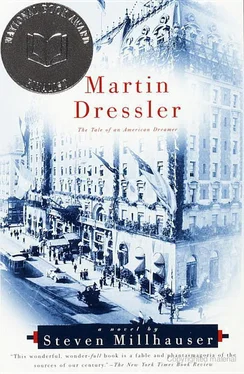Martin envisioned a single, striking image that would draw people to the lunchroom: a bowl of soup with wriggly lines indicating warmth and, just above the bowl, a man’s face with half-closed eyes and a smile of rapture.
Meanwhile his work at the hotel was going well. Mr. Westerhoven knew the hotel business thoroughly, took pride in the Vanderlyn, and behaved with scrupulous fairness toward every member of the staff, though he proved to have one flaw: he liked his hotel just as it was, and was indecisive over the question of costly innovations. He understood that times were changing, that steam radiators were replacing hot-air vents, that room telephones were bound to replace electric buzzers, but he questioned the necessity of such changes even as he bowed, rather stiffly, to the inevitable. He seemed to enjoy hearing Martin’s view of such things, as if this permitted him to maintain his opposition while passing on to his youthful secretary the responsibility for each disastrous turn to the modern. Martin, who believed that the Vanderlyn was in danger of becoming antiquated, argued that up-to-date improvements weren’t luxuries but necessities of the modern hotel, though he acknowledged that the spirit of a hotel was larger and more complex than technology alone could account for: people liked telephones and the new electric elevators and private toilets and incandescent lights, but at the same time they liked old-world architecture, period furniture, dim suggestions of the very world that was being annihilated by American efficiency and know-how. People needed to be assured that they weren’t missing the latest improvements, while at the same time they wanted to be told that nothing ever changed. Hence the cleverness, the sheer genius, of a little invention like the electric chandelier, with its combination of Mr. Edison and the courts of Europe. To Mr. Westerhoven’s objection that this was a hopeless paradox, Martin answered that that was the point: people wanted the paradoxical, the impossible, and it was the Vanderlyn’s job to provide it. The solution, Martin argued, was to move in both directions at once — to introduce every mechanical improvement without fail, and at the same time to emphasize the past, especially in decor. He had seen the same idea at work in the El trains: miles of iron girders and columns, the whole thing a masterpiece of modern engineering, the cars equipped with up-to-date running gear — but step inside those cars and you saw old-world mahogany paneling on the walls, tapestry curtains on the windows, and Axminster carpets on the floors. He had been told that the old-fashioned curtains were hung on concealed spring rollers.
At night in his boyhood bed over the cigar store, beside his old chest of drawers on which stood a hand-painted photograph of himself at the age of six, a dark-haired boy with clear serious eyes, Martin thought of iron El trestles winding and stretching across the city, of department store windows and hotel lobbies, of electric elevators and streetcar ads, of the city pressing its way north on both sides of the great park, of dynamos and electric lights, of ten-story hotels, of the old iron tower near the depot at West Brighton with its two steam-driven elevators rising and falling in the sky — and in his blood he felt a surge of restlessness, as if he were a steam train spewing fiery coalsmoke into the black night sky as he roared along a trembling El track, high above the dark storefronts, the gaslit saloons, the red-lit doorways, the cheap beer dives, the dance halls, the gambling joints, the face in the doorway, the sudden cry in the night.
10. Caroline and Emmeline Vernon
THE METROPOLITAN LUNCHROOM AND BILLIARD Parlor opened on a Saturday in mid-October of 1894, six weeks after Martin’s twenty-second birthday. The facade had been painted a cheerful shade of blue, with yellow trim, and on the sidewalk near the door stood a wooden Pilgrim in breeches and buckle shoes, holding a horn of plenty. The success of the first weekend wasn’t surprising to Martin, who said to Dundee that people were curious and would try anything once; the trick was to get ’em to stick. When they stuck he refused to celebrate, arguing that it was too soon to be sure, though customers were praising the lunch special: corned beef hash served with German browned potatoes fried in butter, with a slice of hot apple pie for dessert. The pies, ordered fresh each morning from a nearby bakery, were three inches thick and flavored with cinnamon. A dip in the fourth week’s revenue convinced Dundee that Martin had been right all along, but Martin gave a shrug and said it was nothing. The same thing had happened with the cigar stand and would happen again. By the end of the sixth week Martin was willing to sit down to a celebratory steak dinner with Dundee, but even as he raised his stein of beer he argued that it would be a serious mistake to stop advertising simply because they were having an early success: now that ads were everywhere you looked, people were starting to feel that the very fact of repeated ads was a sign of success. When Dundee appeared doubtful, Martin proposed that they prepare a questionnaire for customers, asking how they had first heard of the Metropolitan Lunchroom and how many times they had patronized it.
Martin himself had begun to study the classified pages of three daily papers and to make occasional trips north on the Sixth Avenue El, and one day he made up his mind. Without telling anyone he rented a parlor-and-bedroom suite in a new apartment hotel in the West End that seemed to have sprung up overnight on a vacant side street with a view of the Hudson. He had searched the streets and lanes all through the 60s but kept moving north through the 70s until he had found what he wanted: an impossible building set down in the middle of nowhere by an enterprising developer inspired by the example of the Dakota but with his eye on a middle-class clientele. The nine-story hotel, with its medieval turrets and oriel windows and its modern hydraulic elevators, faced a stretch of weedgrown lots where goats roamed behind ramshackle fences. Martin felt he had moved to another city, one younger and more rural, a world he had glimpsed from the El road as he rushed north on his voyages of exploration.
Everything seemed new: the smell of the river through his half-open bedroom window, the runny bright-yellow yolks of poached eggs in the hotel dining room, the wintry early-morning walk over to the El station on Columbus Avenue. He still thought of it as Ninth. Up here, in the wilderness, even the names changed: the northern extension of Broadway was the Boulevard, a wide avenue of hard-packed dirt. From the high platform of the Eighty-first Street station he could see to the west the half-iced Hudson and the red-brown Palisades, to the east the thin dark river and the bluish-brown hills of Brooklyn. Below the Park the train swung east, the track split into the Ninth Avenue and Sixth Avenue lines, already he could hear the bang of his heels down the iron steps of the station and feel steam heat on his cold cheeks as he entered the Vanderlyn. They all thought he was mad, banishing himself like that to the remote north. You’d have thought he had moved to the land of igloos and polar bears. But even as he bent over his desk in a corner of the manager’s office, even as he entered the old Paradise Musée and saw with approval the men standing shoulder to shoulder at the polished oak counter of the Metropolitan Lunchroom, Martin looked forward to the night ride into his untamed neighborhood. Row houses were rising on graded side streets, but here and there a decaying farmhouse sat in a field of pricker bushes and Queen Anne’s lace.
Sometimes, when he walked over to the cigar store on his lunch hour, he felt, as he stepped inside, a sudden impatience, as if the brown dusk, the tulip-shaped globes of the cigar lighter, the jars of sweet-smelling tobacco were part of a world he had left long ago, a world of red horsecars carpeted with straw, of short pants and bedtime stories, of his mother’s hand as they walked up Broadway past big windows and clattering omnibuses. And he longed for Saturday afternoon, for Sunday, when he could walk for hours along the six avenues of his new West End world, under the brown bare elms of the Boulevard or up along the wilder reaches of the Central Park, where tarpaper shanties sprouted in the scrub; when he could walk wherever he liked, turning at a whim to explore the cross streets, many of them muddy lanes, or weedgrown paths between cliffs of rock.
Читать дальше












